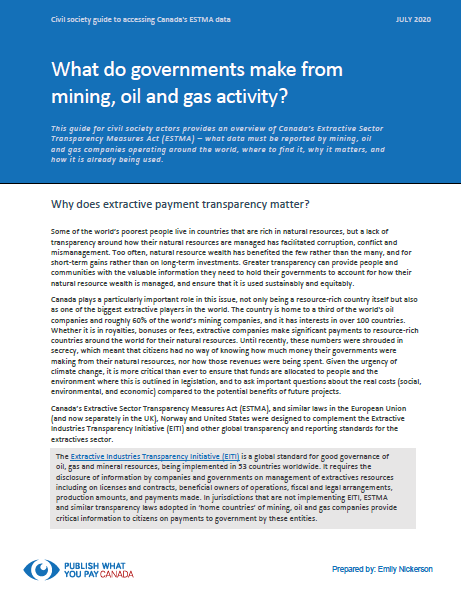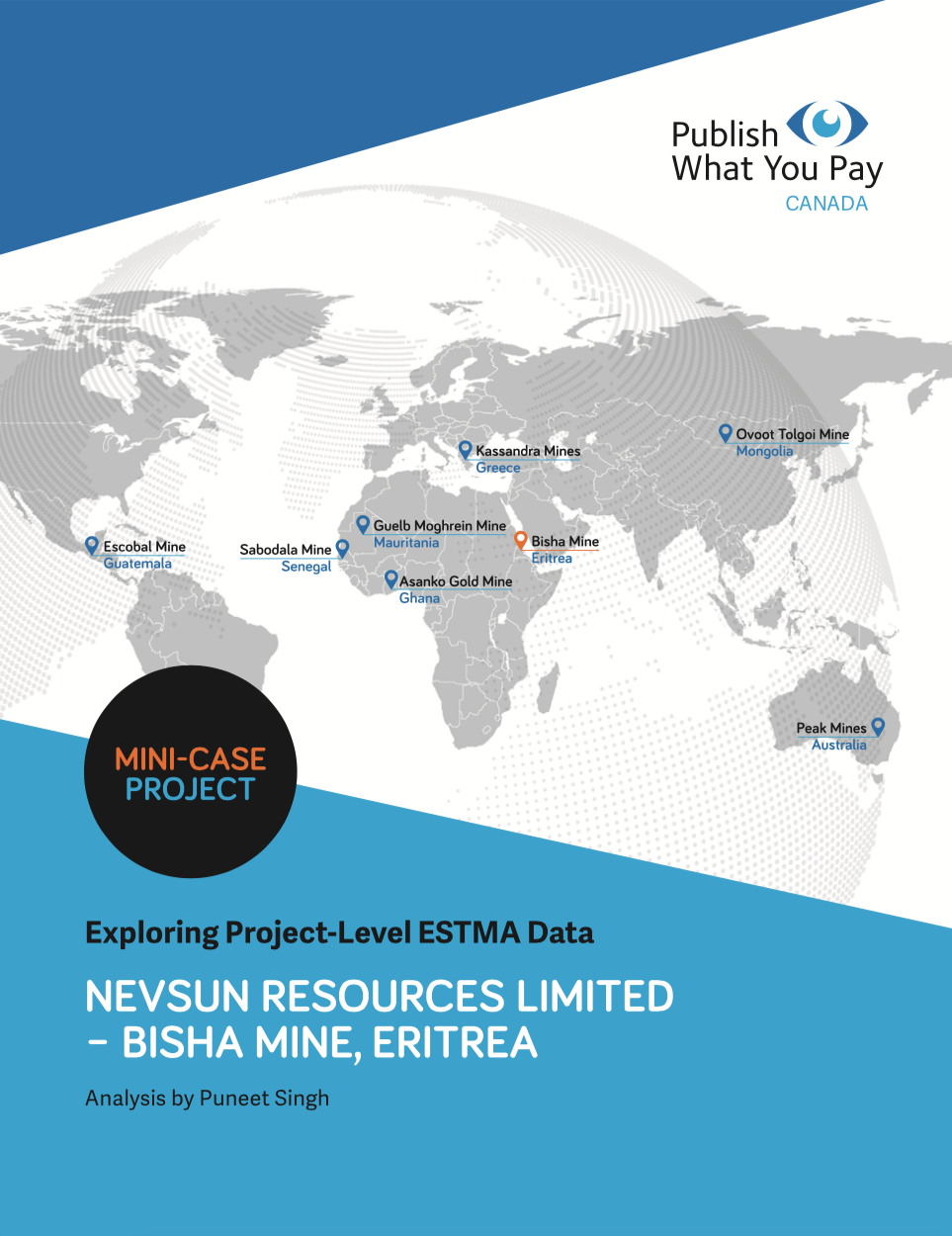This guide for civil society actors provides an overview of Canada’s Extractive Sector Transparency Measures Act (ESTMA) – what data must be reported by mining, oil and gas companies operating around the world, where to find it, why it matters, and how it is already being used.
Read MoreThis case study explores project-level information disclosed by extractive companies. It seeks to contextualize and further explain the company and the payments made in relation to one mine. It is a tool to promote and encourage the use of ESTMA data by journalists and civil society advocates.
Read MoreThis case study explores project-level information disclosed by extractive companies. It seeks to contextualize and further explain the company and the payments made in relation to one mine. It is a tool to promote and encourage the use of ESTMA data by journalists and civil society advocates.
Read MoreThis case study explores project-level information disclosed by extractive companies. It seeks to contextualize and further explain the company and the payments made in relation to one mine. It is a tool to promote and encourage the use of ESTMA data by journalists and civil society advocates.
Read MoreThis case study explores project-level information disclosed by extractive companies. It seeks to contextualize and further explain the company and the payments made in relation to one mine. It is a tool to promote and encourage the use of ESTMA data by journalists and civil society advocates.
Read MoreThis case study explores project-level information disclosed by extractive companies. It seeks to contextualize and further explain the company and the payments made in relation to one mine. It is a tool to promote and encourage the use of ESTMA data by journalists and civil society advocates.
Read MoreThis policy note illustrates how to build a transparent, effective beneficial ownership registry using the lessons learned as well as emerging best practices from other jurisdictions. It is intended to be a prescriptive guide for the Government of Canada to help it to fulfill a promise outlined in the 2017 Budget.
Read MoreAuthor Mora Johnson reports that a number of laws in Canada enable actors involved in business transactions to obscure beneficial ownership, and are out of step with global efforts to address money-laundering and terrorism financing. This report advocates for the creation of beneficial ownership registries across federal, territorial and provincial jurisdictions.
Read MoreMany Ways to Lose a Billion explores the pathways to government revenue loss in the extractive sector, focusing on both protecting the tax rates, but also safeguarding the tax base.
Read MoreIn partnership with the Mining Association of Canada, the Prospectors and Developers Association of Canada, and the Revenue Watch Institute, PWYP - Canada has produced a draft framework for the disclosure of payments to governments for Canadian oil and mining companies operating domestically and internationally.
Read MoreAn Eye on Disclosure: The PWYP-Canada Guide to Accessing Information on Canadian Companies is a tool developed for PWYP partners around the world looking to gain access to information on the companies operating in their areas. The guide provides examples of the type of information that can be found in the securities disclosure documents of Canadian mining companies, as well as instructions on how these documents can be accessed.
Read MoreThis paper features a comparison of the disclosure requirements in Canada and the US, following the US adoption of the Dodd-Frank Act. The paper focuses on two specific requirements set out in the new law, including disclosure of payments to host governments and reporting on measures taken to assure conflict minerals do not enter a company's supply chain. It concludes that harmonizing Canadian disclosure requirements with those set out in the Dodd-Frank Act is necessary in order to ensure investor protection for companies operating on both sides of the border, as well as for Canada to live up to its commitment to transparency and corporate accountability.
Read MoreThis position paper discusses Canada's recent involvement in the EITI as a supporting country, and demonstrates why full implementation of the EITI is necessary to ensure greater transparency in the extractive sector, both nationally and internationally.
Read MorePublish What You Pay Canada has published a pioneering report on public disclosure regulations in Canada's extractive industries. The report details the strengths and weaknesses of Canadian disclosure rules, providing NGOs, investors and the media with a new and detailed roadmap for holding mining oil and gas companies accountable for their activities and policies.
Read More












